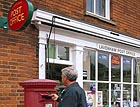Village stores fighting back
Holly Kirkwood talks to rural shop owners who are developing ever more inventive tactics to survive in the face of stiff competition from the out-of town behemoths.


Exquisite houses, the beauty of Nature, and how to get the most from your life, straight to your inbox.
You are now subscribed
Your newsletter sign-up was successful
Wednesday, April 26 2006
In a remote village in the Borders I know of, the local shop had its own building until I was 18, and then relocated into a caravan in somebody's garden for a few years. Now milk and basic foodstuffs for those that require them are to be found within a noble villager's house: if Kara is in, the shop is open; if she is out, then hard luck.
Small local shops have been having a rough time for the past few years. The encroachment of the ever expanding supermarkets has been treading on their toes since the 1950s and as communities slowly dissolve many such shops have proved to be the last bastion of the 'good old days'. Now that ever greater numbers of consumers are waking up to the advantages of good quality food, it is becoming easier for owners and community members to fight the good fight against the supermarket megastores, and many appear to be holding their own, for now at least.
'Everybody's here,' says Hugh Duder, Chairman of County Stores, in Taunton. 'Morrison's, Tesco, Sainsbury's, Marks and Spencer, Lidl, and that's just in town. Out of town we've got an ASDA and another Sainsbury's.'
It helps when you've been around for rather longer than the competition - County Stores has been trading since 1837 - but ever since the supermarkets came it has been a case of adapt or die: 'We've branched out in so many ways,' says Mr Duder. 'The first of the restaurants opened up in 1970, for a start. And we're serving quality produce - everything we sell behind the counters - cooked perfectly in good surroundings,' which sounds nicer than the café in my local supermarket.
Mr Duder stresses that he stays ahead by concentrating on knowing the best local producers in his area inside out, and making sure people know he stocks them. From Plymouth Gin, to Wortleberry Jam, he is the venue to go to for the best the west country has to offer, and this is how he retains his place at the heart of his community.
But it is an uphill struggle, as he will testify, and one which is getting no easier as supermarkets increasingly push their 'artisan cheeses' and 'freshly baked bread'while he must give those who live nearby a reason to drive into town when they can get everything they need outside Taunton is also a challenge.
Exquisite houses, the beauty of Nature, and how to get the most from your life, straight to your inbox.
'Interestingly enough, he gets his inspiration often from his occasional visits to Harrods, but admits he needs ambitious levels of expertise from his staff if he is to reach the dizzy heights of their patisserie counter: 'If my staff could make them, they would shift, I'm sure of it.' Another sign this Chairman doesn't spent even a second resting on his laurels.
Taunton is growing, which is good for all businesses and means that many different shops can stay alive at the same time, but it's not quite so easy for areas where people are leaving rather than moving in, he points out. Not that Taunton is likely to get any smaller any time soon, that is.
Another solution to the problem of making a local shop work in a postmodern age is giving the villagers a vested interest in the outfit: if you've got shares in a business, you're certainly going to make sure you patronise it.
This is just the case with the Village Shop in Sulgrave, Oxfordshire. The local shop and post office were both forced to close in 2002, but two years later a group of local activists had persuaded the council to buy a small property in the village, and had rounded up enough volunteers to make a go of starting afresh. They now work together as a cooperative venture, which is working remarkably well. They have 65 volunteers out of a village of around 160 houses, and the shop is open more often than many London establishments, seven days a week.
Susie Blayney, who was involved from the beginning thinks that this spirit of pulling together has helped its reputation grow, and the business to flourish: 'We have all sorts of people who are in the position we were once in asking for advice about how we did it,' she explains.
'So many, in fact, that we are working closely with the Village Retail Association to develop guidelines for those who want to attempt a similar venture, so everybody doesn't have to reinvent the wheel.'
The Village Shop is now so established that their premises are becoming rather small, and they are looking at ways of expanding, but although supermarkets are the traditional enemy, Mrs Blayney po'inted out that the local Co-op is one business to which they are indebted. Because we are a cooperative as well, they have given us an enormous amount of help,' she says. 'They effectively allow us to use them as a wholesaler, and they give us discounts and credit, and our capital doesn't get too tied up as they store some products for us as well.'
And plans for the future? Well the cooperative must address their lack of space and concentrate, as all small local ventures do, on stocking all the crucial fresh local produce which customers crave. But at least when it comes to gauging levels of satisfaction with the service, they need not spend time and effort on surveys, and look no further than themselves.
Image: Sulgrave Village Shop, Magpie Road, Sulgrave, Banbury, Oxfordshire OX17 2RT, telephone +44 (0)1295 760 066.
